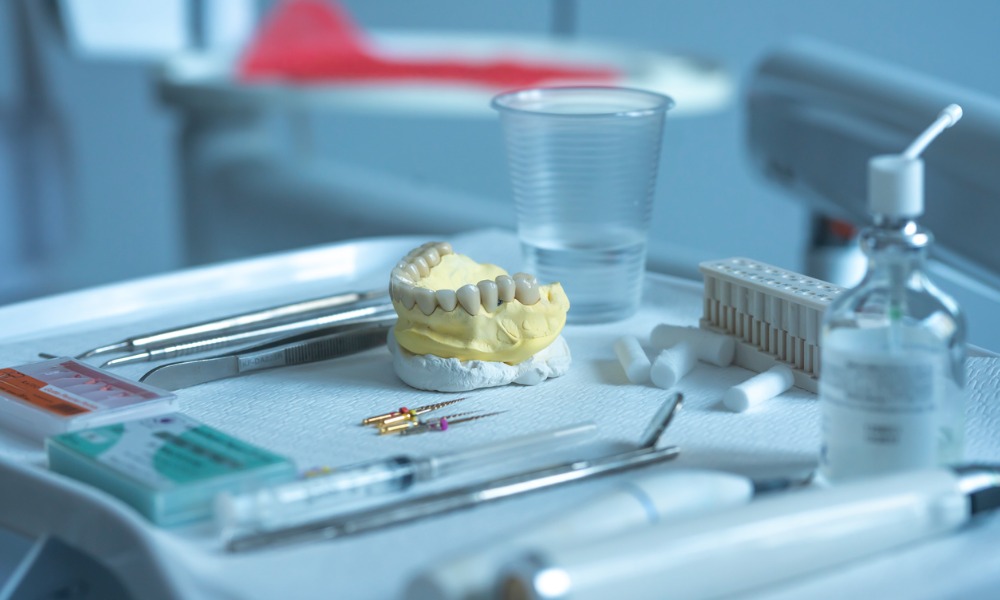Patient allegedly ingested a large amount of anesthetic during a dental procedure

The Ontario Superior Court of Justice has granted summary judgment in a medical malpractice case after finding no genuine issue that requires a trial.
In Ang v. Lin, 2023 ONSC 4446, Sharon Ang commenced a dental malpractice action against Dr. Simon Lin, alleging that the dentist breached the standard of care by administering too much local anesthetic to her. As a result, she allegedly suffered damages.
Ang claimed that Dr. Lin injected “about 30 mg” of the Lidocaine anesthetic, and some of the drug leaked from the needle, causing her to swallow a large amount of the anesthetic. As a result, Ang allegedly developed several long-term medical problems, including memory loss, chest pain, numbness, and weakness of extremities.
Furthermore, Ang alleged that Dr. Lin damaged her gums and various teeth “by cutting, drilling, and shaving them,” and has caused her to develop a “bony sequestrum at the site of tooth 21.” She alleged that Dr. Lin drilled a “huge hole” in the back of her tooth and “shaved and cut” the tooth to “make it weak.”
Dr. Lin denied all allegations of liability and moved for the dismissal of the action through a summary judgment.
The Ontario Superior Court of Justice noted that summary judgment may be granted if the court is satisfied that no genuine issue requires a trial concerning a claim or defence. To defeat a motion for summary judgment, the responding party must put forward some evidence to show that there is a genuine issue requiring a trial. The court emphasized that a responding party may not rest on mere allegations or denials of the party’s pleadings but must set out specific facts establishing a genuine issue requiring a trial.
The court also explained that to establish a breach of the standard of care to support a claim for medical or dental negligence, the plaintiff must lead expert evidence of a physician or dentist practising in the same field as the defendant attesting to the defendant’s negligence. The court also pointed out that medical literature cannot be relied on without an expert attesting to its relevance and reliability.
Dr. Lin denied any treatment in his office that fractured Ang’s tooth 21. He also claimed that he administered one cartridge of anesthetic and, following a treatment period, administered a second cartridge to ensure a continued anesthetic effect. Dr. Lin asserted that the procedure was routine and uneventful. Each cartridge contained 1.8 cc of the anesthetic, allegedly “below the maximum recommended dose for adult patients.
Dr. Lin does not believe that the plaintiff swallowed any of the anesthetics or that any of her alleged injuries are related to the administration of the local anesthetic. He argued that his expert evidence demonstrates that no genuine issue requires a trial, and that the plaintiff’s responding evidence is inadmissible. Further, he contended that even if the plaintiff’s evidence is admissible, it fails to demonstrate that there is a genuine issue requiring a trial.
The court found no evidence that the expert presented by the plaintiff is qualified to give an opinion on the standard of care in Ontario because he does not practice in the province. Furthermore, the court held that even if the plaintiff’s expert was properly qualified to give evidence on the standard of care in Ontario, his evidence is unpersuasive concerning the issue of causation and standard of care.
The plaintiff’s expert report was based on the premise that Dr. Lin injected the plaintiff with more than the maximum recommended dose of anesthetic and caused her to ingest a large quantity of the anesthetic. However, the court found no medical evidence to corroborate this premise.
Conversely, the court accepted the evidence that Dr. Lin administered two cartridges of the anesthetic one hour apart, and each cartridge contained 1.8 cc of the anesthetic, well below the 30 mg maximum recommended dose for an adult patient.
Furthermore, the court gave weight to the evidence that the reported side effects of the anesthetic were temporary, usually lasting 15 minutes to 24 hours.
Accordingly, the court was satisfied that Dr. Lin had demonstrated no genuine issue for trial. The court ultimately granted the summary judgment.










